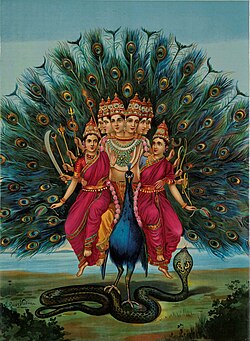Kanda Shasti Kavasam
| Part of a series on | ||||||||
| Kaumaram | ||||||||
|---|---|---|---|---|---|---|---|---|
 | ||||||||
CompositionThe hymn was composed in the 19th century by Balan Dhevaraya Swami.[3] The place where Devaraya Swami staged the hymn is the Chennimalai Subramania Swamy Temple near Erode in Tamil Nadu.[4] The lines 'Chiragiri Velavan' in the hymn refers to the lord of Chennimalai.[5] DescriptionThe song consists of a total of 244 lines, including four introductory lines known as the kāppu, followed by a couple of meditational lines and the main song portion consisting of 238 lines known as the "Kavacham." The grammar employed in the introductory part is the Nerisai Venba and that of the meditational part is the
The author's name is mentioned twice in the song, first in Line 64 and then in Line 201.[2] Poetic formThe song employs Nilai Mandila Asiriyappa, one of the poetic forms in the Tamil language. The armour and meditation parts of the Introduction section employ the Kural venba metre, respectively.[2]
Nerisai Venpa (Prayer)
Kural Venpa (Protection)
MusicThe Kavasam has been set in music by various musicians over the years. The most notable of them all is that sung by the duo Rajalakshmi and Jayalakshmi, popularly known as the Madhyamavathi.[8]
SignificanceSashti is the day that Murugan defeated the asura peacock, which he took as his vahana. The other became a rooster, which and was transformed into his banner .
The devas rejoiced—they praised the deity and prayed to him for six days. Devotees usually narrate the Kanda Sashti Kavacham during this period. Whoever fasts and prays to Murugan for the six days of Kanda Sashti is believed to receive Muruga's blessings. Those who are unable to fast all day can eat once a day or twice a day during this period depending on their health, age and will.
Devotees believe that regular chanting of this song causes the predicaments of life to be resolved and that chanting the full song 36 times a day brings wealth. In popular cultureThe hymn is highly popular in the Tamil-speaking diaspora across the globe that the phrases from the hymn, its music, and others are often imitated by people from all walks of life. The titles of the Tamil movie Kaakha Kaakha, Thadaiyara Thaakka, Thakka Thakka and the Indian soap opera Kakka Kakka are taken from the Kanda Shasti Kavasam. The Tamil film song “Padhinettu Vayadhu Ilamottu Manadhu” from the movie Surieyan imitates the tune of the hymn.[9][10] ControversyIn July 2020, Karuppar Kootam, a Periyarist-Dravidian group, posted a YouTube video with an interpretation of the hymn that many Hindus around the world considered to be vulgar and offensive.[4] Soon after the incident, following a complaint filed by the Bharatiya Janata Party Tamil Nadu with the Commissioner of Police, Greater Chennai City, the Tamil Nadu Police arrested two members of the YouTube channel.[11][12] See alsoReferences
External linksWikisource has original text related to this article:
|
